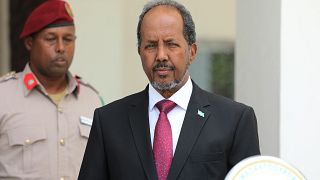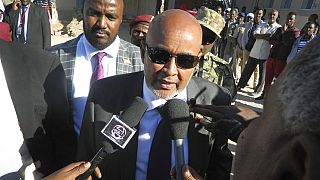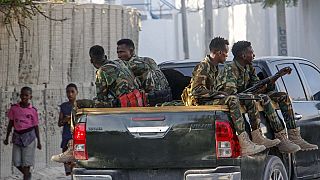Somalia
Somalia's President Hassan Sheikh Mohamoud, who returned to power Sunday after a marathon vote, is a former academic and peace activist whose first term was marred by accusations of corruption and infighting.
President between 2012 and 2017, he then distinguished himself by his fierce criticism of outgoing head of state Mohamed Abdullahi Mohamed - known as Farmajo - who defeated him five years ago.
He played a crucial role in the violent protests in Mogadishu as Farmajo sought to extend his term of office, which expires in February 2021, without agreement with regional leaders on holding new elections.
Born in 1955, Hassan Sheikh Mohamoud is the first Somali head of state to be re-elected for a second term, promising to transform the country, shaken by a long political crisis, into a "peaceful country at peace with the world.
He will have to face several major challenges: a historic drought - which could lead to famine - is raging in the country, which is also plagued by an insurgency of radical Islamists, the Shebab. The latter had attempted to assassinate Hassan Sheikh Mohamoud during his first term.
He will also have to repair the damage done by months of political chaos and power struggles within the institutions.
Born in 1955 in Jalalaqsi, in the central region of Hiran, Hassan Sheikh Mohamoud is from the powerful Hawiye clan, which has a majority in the capital Mogadishu.
He entered politics in 2011, when he founded the Peace and Development Party. In his party's manifesto, he stated his goal of "building a society free from the demons of clanism, fear and internal conflict.
At the time, no one was betting on his chances of becoming president. His victory a year later raised hopes that the Horn of Africa country would regain stability.
His government was the first to receive global recognition and billions of euros in international aid since the fall of the authoritarian Siad Barre regime in 1991.
But he has largely disappointed his supporters, who have denounced corruption and infighting, as with previous administrations.
In particular, there have been long-running disputes between President Mohamoud and two of the three prime ministers he appointed, who were eventually dismissed.
Two governors of the central bank also stepped down following allegations of corruption that surrounded his administration, which he denied.
The new president was educated at the Somali National University before the fall of dictator Siad Barre and holds a master's degree in technical education from the University of Bhopal in India.
His resume includes work with the United Nations Children's Fund (UNICEF), with whom he worked in his country in the early years of the collapse of the Somali state. He also co-founded the Somali Institute of Management and Administrative Development (SIMAD) in 1999.
Having won the support of the other anti-Farmajo candidates, he will now have to set about reunifying the country, observers say.
"The country is very polarized," Samira Gaid, executive director of the Hiraal Institute specializing in security issues, told AFP ahead of Sunday's poll. "This electoral process that has been so long offers a 'reset' button," she added.











01:00
Somaliland counts votes after pivotal election
00:58
Voting underway in Somalia's breakaway region of Somaliland
Go to video
US announces visa restrictions for Ghana
Go to video
Tunisia: Kais Saïed takes oath for his 2nd presidential term
01:11
Frelimo's candidate wins in Maputo amid ongoing vote count
01:40
Young Tunisians disillusioned by economy, pace of change